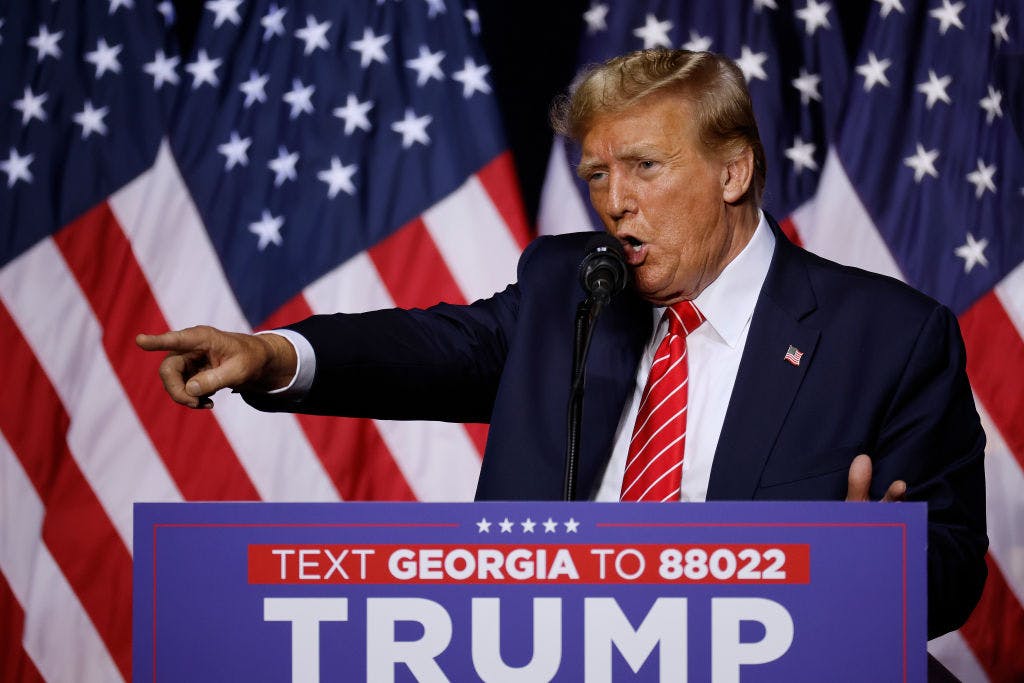Trump Argues That Jack Smith’s Mar-a-Lago Case Is Void, ‘Vague,’ Marked by ‘Grave Infirmities,’ and Violates His Rights
The former president invokes the ancient ‘rule of lenity’ to fend off charges that he mishandled America’s secrets.

Judge Aileen Cannon will hear on Thursday President Trump’s contention that the Espionage Act under which he is criminally charged is fatally flawed, an argument that, if vindicated, could mean the end of the case against him.
Mr. Trump’s argument, memorialized in a motion to dismiss, makes the case that the Espionage Act is unconstitutional as applied to former presidents. It could lead to the Supreme Court weighing the law under which whistleblowers Daniel Ellsberg, Chelsea Manning, and Edward Snowden were prosecuted, and a communist couple, Julius and Ethel Rosenberg, were put to death.
The 45th president faces in the Mar-a-Lago case 32 charges under the Espionage Act, which was passed in 1917. In calling for the law, President Wilson sought a tool to counter those he accused of having “poured the poison of disloyalty into the very arteries of our national life; who have sought to bring the authority and good name of our Government into contempt.”
The motion, though, highlights “grave infirmities” with the relevant portion of the statute and asserts that “there was no consensus meaning attributed to the problematic language” that it claims undermines its drafting. Efforts to “save” the statute, Mr. Trump’s lawyers argue, run afoul of one of the cornerstones of the criminal law — the rule of lenity, which mandates that in respect of the interpretation of criminal statutes, ambiguity is to be resolved in the defendant’s favor.
The rule is rooted in English common law. Chief Justice Marshall wrote in 1820 that the “rule that penal laws are to be construed strictly, is perhaps not much less old than construction itself. It is founded on the tenderness of the law for the rights of individuals; and on the plain principle, that the power of punishment is vested in the legislative, not in the judicial department.”
Mr. Smith calls the Espionage Act “clear” and, in his opposition to Mr. Trump’s effort to dismiss the charges, characterizes the former president’s argument as “meritless.” He adds that Mr. Trump “could not have failed to understand the paramount importance of protecting the Nation’s national security and military secrets.” The prosecutor maintains that there was “nothing vague” about the 45th president’s “paradigmatic” violations of the statute.
The Supreme Court, though, has written that “in our constitutional order, a vague law is no law at all” and violates the “twin constitutional pillars of due process and separation of powers.” Due process is affronted because fair notice is a component of culpability. Separation of powers is implicated because a vague law means that the courts, not Congress, are effectively defining its meaning.
The section of the Espionage Act under which Mr. Trump is charged targets “Whoever having unauthorized possession of . . . any document . . . relating to the national defense” as well as anyone who “willfully retains the same and fails to deliver it to the officer or employee of the United States entitled to receive it.” The possessor must believe that the “documents could be used to the injury of the United States or to the advantage of any foreign nation.”
A dissenting justice, John Marshall Harlan II, in New York Times Co. v. United States — the “Pentagon Papers” case involving Ellsberg — called this clause a statute that was “singularly opaque,” meaning vague or indeterminate. Mr. Trump cites law review commentary that finds the Espionage Act a product of legislative drafting “at its scattergun worst” and “undoubtedly the most confusing and complex of all the federal espionage statutes.”
For Mr. Trump, vagueness infects the phrase “unauthorized possession,” which Mr. Smith contends characterizes the former president’s relationship to the 32 documents whose presence at Mar-a-Lago the prosecutor charged as serious crimes. Mr. Trump, though, responds that they “are only allegedly classified because of President Trump’s Original Classification Authority, which is a power derived from Article II of the Constitution, wielded pursuant to the people’s mandate in 2016.”
The motion to dismiss also cites the Presidential Records Act, a Watergate-era statute that has become a contested component of the case. Mr. Trump claims that the “non-criminal nature of the PRA’s exclusive remedy for collecting Presidential Records” means that his possession of the documents could not have been unauthorized, at least criminally.
Mr. Trump explains that “elected officials have failed to agree on language that provides the notice required by the Constitution, and it is not for the Court to ‘save’ this prosecution from that defect.” This means that the former president, who thought he was operating under a non-criminal regime, could not have fairly been expected to know that an FBI search was forthcoming.
Also of indeterminate meaning, Mr. Trump posits, is the phrase “relating to the national defense.” In 1945, the United States Circuit Court for the Second Circuit reckoned that “it seems plain that the section cannot cover information about all those activities which became tributary to ‘the national defense’ in time of war; for in modern war there are none which do not.”
Mr. Smith replies that no clearance allowed Mr. Trump to store the documents at a “social club, frequented by thousands of employees, members, and visitors, with none of the safeguards required.”

